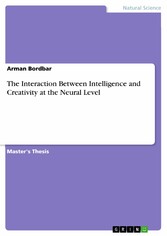The Interaction Between Intelligence and Creativity at the Neural Level
von: Arman Bordbar
GRIN Verlag , 2019
ISBN: 9783668961180
, 87 Seiten
Format: PDF
Kopierschutz: frei
Preis: 36,99 EUR
eBook anfordern 
Mehr zum Inhalt

The Interaction Between Intelligence and Creativity at the Neural Level
Master's Thesis from the year 2018 in the subject Biology - Neurobiology, grade: 7/10, University of Trento, language: English, abstract: Intelligence and creativity are two complementary ability of thinking whose combination forms the foundation of adaptive thinking developed during the history of human evolution. These two fundaments of adaptive thinking have some characteristics which raise the question of whether they interact at the neural level. The divergent attribute of creative thinking versus convergent property of intelligent thinking can be an example. Another question regards to developing both abilities and how brain anatomy can support this possibility. The present study tries to investigate this interaction and explain how brain connectivity can be associated with one ability taking into account the other one. Thirtynine adults participated while intelligence and creativity measured through inferential and creative thinking scales of ASK test. To evaluate the brain connectivity, DTI was applied, and FA (Fractional Anisotropy) values have been analyzed through TBSS (Tract-based Spatial Statistics) protocol. The results support the idea that developing both thinking abilities is associated with less connectivity of some brain areas which up to a threshold, their connections support the development of each skill.
My childhood curiosity about automatic machines, as simple as a watch, transformed by time to a passion about designing automated processes, as complex as computational models of cognition. I started my academic career by studying computer engineering. During the course, I improved my mathematical sense of data processing and got familiar with algorithm design beside principles of circuits such as electric, electronic and digital. Getting to know the nature of the human mind, my enthusiasm to study the brain as a unique data processor grew. I started a bachelor course in neuroscience. During the course, I learned the principles of human psychology and cognition and the biological aspects of mind. Bringing together computational and psychological knowledge I did a project for my bachelor thesis which aimed to simulate visual cortex functions by deep networks. During this project, I studied machine learning and different computational models of cognition. I continued neuroscience study to the master level where I deepened my understandings of the neural aspects of cognition beside the principles of neuropsychological disorders and rehabilitation. The last year of the course I was involved in neuroimaging data analysis. I ran a DTI data analysis project of alcohol dependence in mouse models where I got familiar with the concepts of neuroimaging data preprocessing and statistical analysis. For my master thesis, I analyzed a set of human DTI data which concerned the study of the interaction between intelligence and creativity at the neural level. In summary, I am passionate about the brain, data science, and artificial intelligence. My computational background with an engineering slant along with psychological knowledge with a neuroscience perspective let me take part in brain science research activities with a quantitative approach.











